INDIA
Agantuk
(The Stranger)
The
Chess Players
Company Limited
Days
and Nights in the Forest
Goddess
(Devi)
Pather Panchali
Pratidwandi (The Adversary)
Two Daughters
The World of Apu

Visit
the
Satyajit Ray Foundation
website
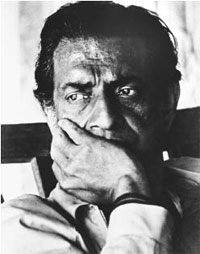
|
AGANTUK (The
Stranger)
(1991/Colour) Director: Satyajit Ray
"Agantuk" ("The Stranger") was Satyajit Ray's last film,
and it shows all the virtues of a master artist in full maturity.
With the simplicity that comes
with complete command of his
medium, Ray begins his story
with a letter. The recipient,
Anila (Mamata Shankar), is
a typical
middle-class housewife living with her husband, Sudhindra (Deepankar De),
and son in Calcutta; the letter
writer is an uncle who left
India 35 years ago,
following his wanderlust to the far corners of the globe. Or at least that's
who he claims
to be. Anila hasn't actually seen her uncle since she was a baby, a fact
that the uncle makes note of.
Nevertheless, he calls on the
family's sense of "traditional
Indian hospitality" and asks to be taken in until he takes up his travels
once more.
In laying out these details, Ray—by far India's most renowned director—works
in the unhurried, observant style that made him one of the cinema's most respected
filmmakers. His focus, as always, is the human elements. But he is also interested
in ideas, and in that sense, "Agantuk" is more conceptual, more
Shavian and less naturalistic than most of his earlier work.
|
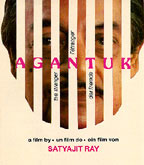
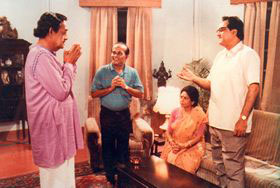
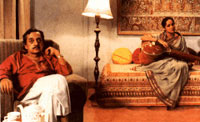
|
THE
CHESS PLAYERS
(1977,
Colour)
Director:
Satyajit
Ray
One
of
Satyajit
Ray's
most
beautiful
films:
two fanatical chess players play game after game, while a bigger game
of chess - a political one - is being played out around them. Richard
Attenborough and Saeed Jaffrey give mesmeric and memorable performances.
COMPANY
LIMITED
(1971/black-and-white)
Director: Satyajit Ray
This powerful psychological drama follows a young executive's climb up the
corporate ladder and his slow immersion into corruption, seen through the eyes
of his young sister-in-law.
Shyamal (Barun Chanda) is an ambitious Marketing Manager in a British firm
in Calcutta, manufacturing fans. He's married to Dolan, and lives in a company
flat. He aspires to become the company director. For this he has to compete
with a colleague who has a relative in the board of directors. The film boldly
lays bare the price which is inevitably extracted, in the blind pursuit of
material success.
|
|
DAYS
AND NIGHTS IN THE FOREST
(1969, B/W) Director: Satyajit Ray
This is Ray's most overtly Renoir-ish film, almost a remake of Une Partie de
Campagne. Here, however, it is not the French bourgeois family setting off for
a picnic, but four young men leaving Calcutta for a few days in the country.
Bringing with them their westernised careerist attitudes, their middle-class
indifference to the lower orders, and a self-satisfaction that leaves them closed
to experience...
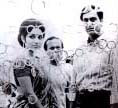 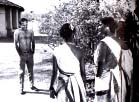 |
|
GODDESS
(DEVI)
(1960,
B/W) Director: Satyajit Ray
In
The Goddess Ray deals with
a subject that figures only
marginally in his other films:
the field of popular religion.
He shows us a conflict between
the old and the new India,
in the form of a clash between father and son, with the soul of the
son's beautiful young wife as the prize.
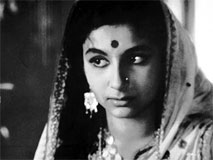 PATHER
PANCHALI
(1955
B/W)
Director:
Satyajit
Ray
The first film in Satyajit Ray's famous "Apu
Trilogy", it is the saga of an impoverished Brahmin family living in
a small Bengali village. Haunting and evocative, it takes the hero
through his early years up to adolescence.
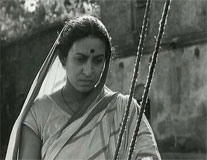 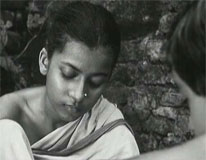 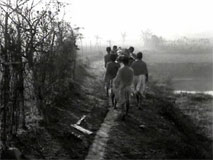
TWO
DAUGHTERS
(1961,
B/W) Director: Satyajit Ray
Another
prize-winning film from Satyajit
Ray, based on stories by Rabindranath
Tagore.

THE
WORLD OF APU
(1958,
B/W)
Director:
Satyajit
Ray
The
final
part
of
Satyajit
Ray's
acclaimed
'Apu Trilogy', and a unique work in its own right. A visually brilliant
film, demonstrating Ray's remarkable talent for making even the most
commonplace event representative of our deepest feelings.
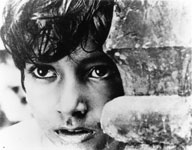 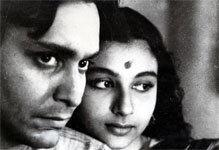
PRATIDWANDI
(The
Adversary)
(1972/B/W)
Director:
Satyajit
Ray
Opening
with
negative
black
and
white
photography
to
signal
a dreamlike
sequence,
Satyajit
Ray
signals
that
Pratidwandi
(The
Adversary)
will
differ
from
his
previous
work.
Better
known
for
his
films
about
rural
India
(The
Apu
Trilogy)
and
for
period
pieces
(The
Music
Room
and
Charulata),
he
tackles
Calcutta's
contemporary
1970's
social
and
political
issues
directly
with
this
film.
Despite
the
subject
matter
and
snippets
of
Buñuel-like
surrealism,
you
can
still
identify
Ray's
signature
temperament
and
style
as
the
film
reaches
its
final
reel.
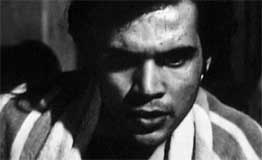
|

